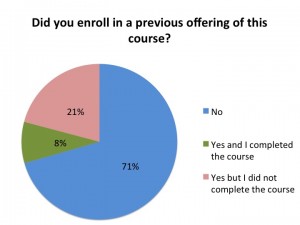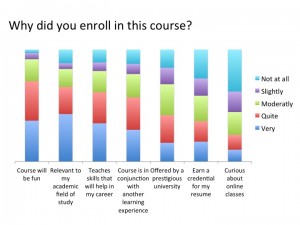Jan 31, 2014
Medical Neuroscience Session 2: Who Enrolled and Why?

admin
The results from the pre-course survey for the second run of Duke’s Medical Neuroscience MOOC are in! Of the over 5000 students who completed the survey, 8% previously completed the first session in Spring 2013. This means that, if the survey is representative of enrollments, over 2,200 people who completed the first session found it […]
The results from the pre-course survey for the second run of Duke’s Medical Neuroscience MOOC are in! Of the over 5000 students who completed the survey, 8% previously completed the first session in Spring 2013. This means that, if the survey is representative of enrollments, over 2,200 people who completed the first session found it so beneficial that they have returned to learn even more!

Other students (21 %) attempted the first session of the course but did not complete it. In the post-course survey from the first session, several students indicated that they had not completed that session but planned to return. For example, one student wrote,
Excellent course, one of the best MOOC’s I have taken so far, I really regret I haven’t had enough time to take it through, so I’m looking forward to the new iteration.
The survey also reveals that significantly more students now begin Medical Neuroscience with previous experience in an online class compared to one year ago. The chart below (click to enlarge) shows the percent of students in the current and prior sessions of Medical Neuroscience who have experienced different online learning platforms, and those for whom this course is their first time learning online.

As shown, in 2013 33% of students had never taken an online course before. One year later, this had dropped to 23%. Conversely, in 2013 just under half of the students had taken a Coursera course before. By 2014, this had grown to 63%. This reflects the extremely rapid rise in enrollment in online learning opportunities, particularly Coursera courses.
The last fact we want to highlight is that students in Medical Neuroscience enroll both because they want a challenging academic course, but also because they genuinely find it enjoyable to study the material. The chart below (click to enlarge) shows reasons students gave when asked why they enrolled in the course.

The dark blue and red bands at the bottom represent things that students felt were “very” or “quite” important. As we would expect in a highly rigorous course such as Medical Neuroscience, the fact that it is relevant to a student’s academic field of study was important to most (66%) of the students. However, in this case a difficult subject matter does not mean a boring class. The majority (71%) of students cited “the course will be fun” as an important reason they enrolled in the class.
Finally, we love how diverse our student body is in this course! In their own words, here is how some of the students describe their backgrounds:
I am a biology graduate student exploring research on how cytokines affect neuron function.
I am an executive coach and trainer, and previously spent 20+ years in various levels of management.
I am taking this course to gain a better understand the mechanics of pain and especially migraine headache as I and my mother both suffer with them way too often.
I am a consulting neuropsychologist and also teach, among other topics, brain and behavior courses.
I’m applying to medical school in the fall.
I am an administrative judge in the US doing cases involving a lot of health law.
I am a mathematician and an economist.
I’m currently in high school and taking college-level Chemistry and AP Psychology.
As you might guess from such a diverse group, students range in age from under 13 to over 65. Five percent of the students are pre-college, while 8% hold a doctorate degree. This diversity has led to a very active discussion forum with over 3,000 posts and comments in the first 4 weeks.
Once the course ends, we’ll post another update about how things went. Early indications are that student engagement is high and the students respond especially well to Dr. White. The following posting to the discussion board is representative of a sentiment shared by many students,
I believe this is one of the best courses not only in Coursera, but also every university offering the same field, [based on] the way our instructor is helping us so far.
Thank you to Sulochana Naidoo, Online Course Associate, and Andrea Novicki, Academic Technology Consultant, for feedback and assistance with this post.